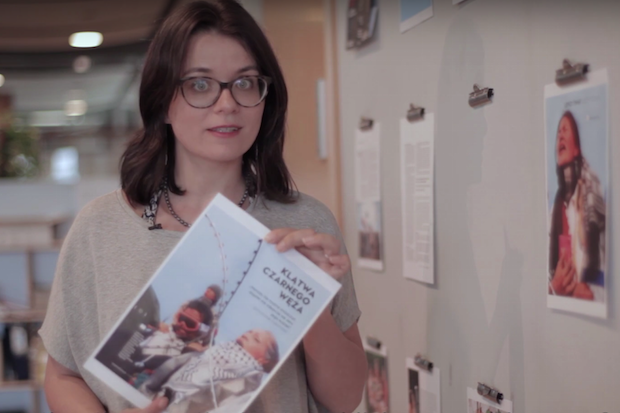Would a news agenda and front page put together entirely by female editors differ from the standard mass media narrative? Would readers still see reporting about the same issues, and would articles be given the same prominence on the homepage?
A new initiative called NewsMavens, spearheaded by Polish newspaper Gazeta Wyborcza with support from Google's Digital News Initiative Fund, wants to find out by bringing together a group of women editors from newspapers all around Europe to curate stories produced by their newsrooms about European issues and news events.
I'm very curious to find out if there is a gender effect in what stories we choose to tellZuzanna Ziomecka, Gazeta Wyborcza
The curators will have complete freedom over their recommendations and how often they can contribute. Each story they feature from their organisation has to be accompanied by a short explanation of why it is relevant.
The content will be available on the NewsMavens website when the project launches at the end of September, with the goal of creating a newsletter a few months into the project.
Zuzanna Ziomecka, project lead, derived the concept for NewsMavens from her work as digital editor of Wysokie Obcasy, the weekend supplement of Gazeta Wyborcza, which features reporting about the world "from women's perspective".
"My work with [Wysokie Obcasy] helped me to understand a feminist perspective, not just on Polish politics and social issues, but also on our own industry," Ziomecka told Journalism.co.uk.
"Thinking about women's role in newsrooms, a question came to me: if we're not the ones saying 'this has to be on front page', or 'this issue has to be followed', if it's not women who are making these calls, the narrative we have about current events and reality is a male dominated narrative.
"And I'm not sure whether a female dominated narrative about news is going to differ from the standard mass media one, but I'm very curious to find out if there is a gender effect in what stories we choose to tell and which ones we find to be the most important."
The project combines this hypothesis of the potential gender effect on the news agenda with the idea of curation and collaboration. Many newsrooms have started up newsletters to highlight the most important stories of the day, or to offer recommendations for what people should watch, buy or cook, and there are also standalone newsletter brands that are little or not at all attached to websites.
"There is a deluge of information, which traditional media is also contributing to, so it occurred to me that maybe [curating and] helping people sift through this information is an area news media could look more closely to."
The collaborative aspect of NewsMavens is a move towards "trying to gain back our monopoly on reach" through European newsrooms' understanding that "when we work in our respective countries, we don't constitute competition to one another".
So, by having women from different European titles involved, Ziomecka wants to "create an opportunity for them to work outside the confines of their newsrooms".
"The statistics are that women occupy less than 30 per cent of management positions in European newsrooms, with some countries such as the Nordics lifting the average.
"But if they have a stagnant gender situation in their newsrooms, which is something for each company to deal with individually, let's create our own front page together to see if it's different to the one our colleagues are putting together."
Let's create our own front page together to see if it's different to the one our colleagues are putting togetherZuzanna Ziomecka, Gazeta Wyborcza
Ziomecka is in the process of reaching out to women at European news organisations, big and small, legacy and start-ups, who will be able to curate stories written in their own languages, not just in English – only their recommendations will have to be in English.
The driving force, she hopes, will be the quality of writing, the "emotional charge of their recommendations" and the justification behind their choices. As it progresses, NewsMavens will also feature interviews with international women of influence about the stories handpicked by female editors that were most impactful to them.
"Most newsrooms I'm talking to don't have English language content and I think that's ok, because of the way readers approach content they find online.
"They're mainly skimming to get the most important facts, and then if they're interested in the full story, they have Google Translate. If the publisher sees there's a lot of interest, maybe that will provide the motivation to translate the stories."
Ziomecka explained that when she pitched the NewsMavens project to her editor, he encouraged her to pursue it, but kept "increasing the scale" and pushing her to try to get women from all over the continent involved, not just a handful of partners.
"It was a no brainer to follow his advice. People don't feel connected to the EU, so I want us to tell the story of the EU in a more attractive way.
"I won't choose any preferred subjects because none are. We will see if the narrative is different by giving the curators freedom to choose."
Free daily newsletter
If you like our news and feature articles, you can sign up to receive our free daily (Mon-Fri) email newsletter (mobile friendly).
Related articles
- Michael MacLeod, founder of The Edinburgh and London Minute, on growing a curated, community newsletter
- 10 newsletters about AI for journalists
- New European journalism database facilitates cross-border collaboration
- Predictions for journalism 2024: audience-first strategies, formats and products
- The Wall Street Journal launches archived content newsletter












